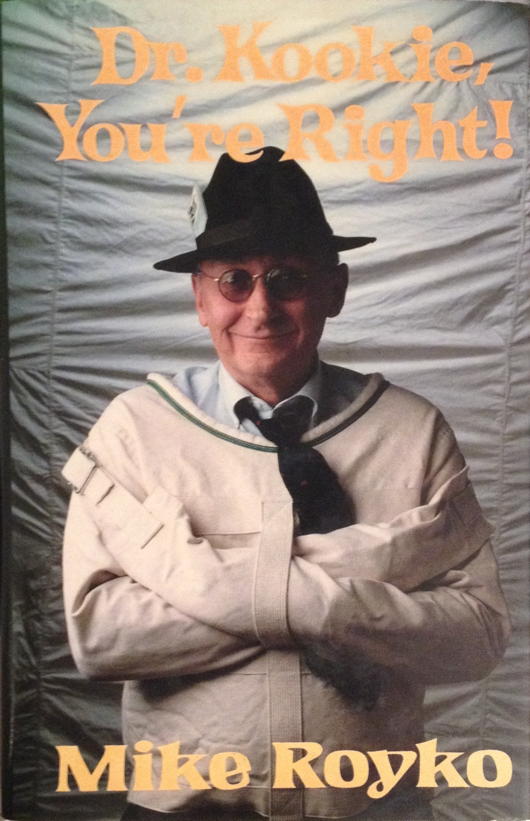Mimsy Review: Dr. Kookie, You’re Right!
When my grandfather sat on the front steps wearing his long underwear tops and drinking beer, it never occurred to me that he was a fashion trendsetter.
Around the net
Mike Royko’s• final collection of essays, from the second half of the eighties, highlights his bias as much as his great writing.
| Recommendation | Special Interests• |
|---|---|
| Year | 1989 |
| Length | 280 pages |
| Book Rating | 5 |
Dr. Kookie, You’re Right!• includes a smattering of Royko’s Chicago Tribune pieces from 1984 through 1989. This would be immediately following his leaving the Sun-Times because he couldn’t stand working for Rupert Murdoch. In order to avoid working for Murdoch, he went to work for the “conservative” Chicago daily, and I have a suspicion his work here is extra-shrill because he wanted to distance himself from the paper for which he’d once promised he would never work.
But even given that there is a lot in here that makes me realize Royko was part of the Democratic media machine, at least nationally. At one point he takes Reagan to task for praising Truman and FDR on the national campaign trail rather than, say, Lincoln. Nowadays, I recognize that Republicans praising Lincoln for being a Republican is mostly unreported because it is against narrative. The press seems to want to think Lincoln was a Democrat. So it is possible that the same media filter was active in the eighties.
Royko, however, blames this praise for Truman and FDR on a racist Southern strategy; he does this in a passive-aggressive way to make it harder to call Royko on the accusation. But this was more likely a Democrat strategy, to the extent that it was a strategy at all. You don’t get Democrats to vote for you by praising Republicans. You get there by praising Democrats. And while, certainly, in those parts of the South where Democrats still dominated racism still abided, attracting them by praising Truman and FDR hardly seems egregious.
But take Royko at face value that hidden racism was worth mentioning. A few essays later, Royko talks about Senator Byrd. Now, I had no idea Byrd founded his own KKK chapter until long after the eighties, when the Internet ran an end-run around the media. But it wasn’t a secret from the media. Royko doesn’t go against narrative here either; he simply doesn’t mention it. Real racism by Democrats is less important than manufacturing racism by Republicans.
I remember Royko as more independent than this, and checking the previous collection on my shelf, my memory isn’t deceiving me. Of course, in Chicago, if you’re going to criticize politicians you have to criticize Democrats, because that’s who runs Chicago, especially in the era of the Daley machine. But this book was disappointing compared to Sez Who? Sez Me• and Like I Was Sayin’. His criticism of national Republicans vs. national Democrats seems much more blatant in this selection.
That said, if you enjoy Royko and you run across a copy of Dr. Kookie•, I’d still recommend picking it up. The less political pieces hold up, such as the busboy who violently robs his employer and is then eligible for unemployment insurance and his self-deprecating story of taking part in the Great Pie-in-the-Face Craze of the seventies.
In response to Mike Royko’s Opinions: Mike Royko would have been almost gonzo if he’d been more Libertarian. Certainly, he was growing that way before he died, especially with his views on drugs and modifying his stand against gun control.
Dr. Kookie, You’re Right!
Recommendation: Special Interests•
If you enjoyed Dr. Kookie, You’re Right!…
For more about Mike Royko, you might also be interested in Mike Royko’s Opinions, The Best of Mike Royko: One More Time, For the Love of Mike: More of the Best of Mike Royko, Mike Royko: A Life in Print, The World of Mike Royko, Mike Royko on firearms, and How to Cut Crime.
- Dr. Kookie, You’re Right!•: Mike Royko (hardcover)
- Writing for what he considered conservatives, Royko seems to have veered off to the left, and straight into confirmation journalism. He digs deeply for sinister motives against Reagan, and ignores them in Democrats such as Senator Robert Byrd.
- Like I Was Sayin’•: Mike Royko (hardcover)
- “Like I Was Sayin’ covers the switch from the The Daily News to The Sun-Times. Highlights include the loss of his friend John Belushi and the Nelson Algren Street fiasco.”
- Sez Who? Sez Me!•: Mike Royko (hardcover)
- “Sez Who? Sez Me covers the Nixon years, and through Jimmy Carter into Ronald Reagan. But Royko covers a lot more than politics; life in Chicago is itself gonzo.”


